Biden departs Israel for Saudi Arabia
The latest updates from US President Joe Biden's first official trip to Israel since taking office.
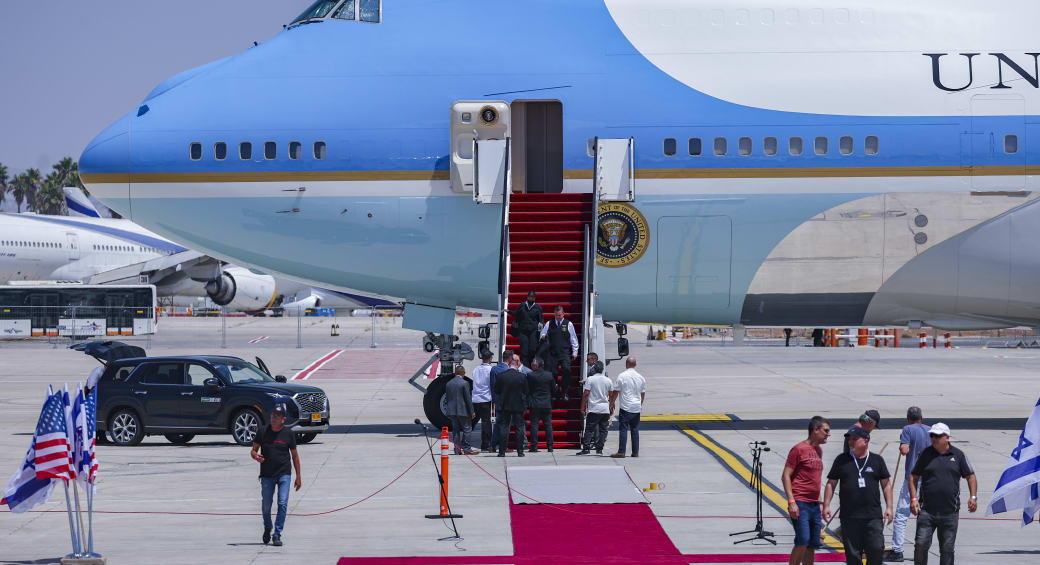
Prime Minister Lapid prepares for bilateral meeting with Biden
Prime Minister Lapid prepares for bilateral meeting with Biden

Prime Minister Yair Lapid prepared this morning for his bilateral meeting with US President Joe Biden at 11:15 a.m.
What does using force against Iran ‘as a last resort’ mean for the US? - analysis
Israeli intelligence has often taken action based on a partial picture of what was going on in the Islamic Republic, despite uncertainties that might have meant it was acting prematurely.

Last night, US President Joe Biden said that he would use force to stop Iran from getting a nuclear weapon "as a last resort."
That sounds a lot like what a number of Israeli officials - from former IDF chief Gadi Eisenkot to former Mossad chief Tamir Pardo - have said.
So is it the same thing? Probably not. The trick is defining what "a last resort" really means.
First, what does it not mean?
Former Mossad director Yossi Cohen, possibly current IDF Chief-of-Staff Aviv Kohavi and current Mossad Director David Barnea, might be in favor of striking even before the "last resort" moment.
No one wants to define this point exactly, but it would likely be once Israeli intelligence would show that Iran had made the political decision to go for a nuclear bomb and was three months or so away from accomplishing some of the tasks for this which it has not done to date.
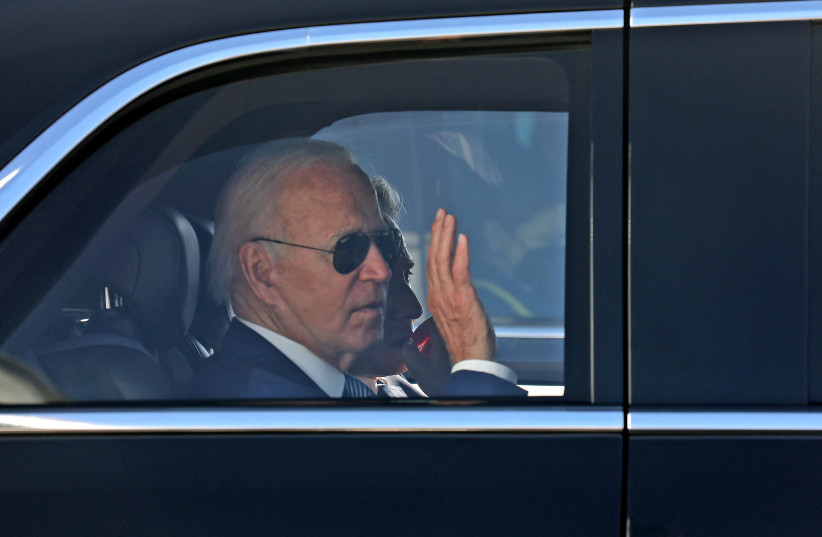
Then there are former prime ministers Naftali Bennett and Benjamin Netanyahu.
They might go for an attack also three months before, but they would almost certainly go for an attack if intelligence reported that Iran was weeks away from developing a nuclear bomb or positioning forces for potential use - meaning close enough that waiting could risk missing the moment to stop it. What Biden's statement probably means is that if US intelligence was convinced that a nuclear weapon had been developed and was on the way to being potentially deployed (within days or hours), it would then seriously consider attacking that deployment.
The difference between Israeli and US "readiness"
These differences in Israeli and US readiness to attack are not just distinct in time but in substance.
Israeli intelligence has often taken action based on a partial picture of what was going on in the Islamic Republic, despite uncertainties that might have meant it was acting prematurely.
The reason is that Jerusalem views the risks with Tehran as so high and so personal (Iranian leaders have said they want to wipe Israel off the map), that waiting for more certain confirmation sometimes is too great a risk.
In contrast, the US views the ayatollahs as a distant threat. They are not Iran's direct target and in any case, even if Tehran developed a nuclear weapon that could reach Israel, it could take the Islamic Republic another couple of years to develop missiles that could hit the US - which is much farther away.
Next, any Israeli attack might be wider than a US attack. Jerusalem might decide that if it is rolling the dice with the Islamic Republic to try to go big, and take out several nuclear sites, along with many anti-aircraft batteries.
In the highly unlikely event that the US used force, it might be much more narrowly tailored against deploying a specific weapon, or one nuclear site where that weapon was waiting to be deployed.
Moreover, US intelligence often will reject Israeli intelligence as too uncertain or with too many holes to be relied upon for taking action.
Even former US president George W. Bush, known for being much more ready to use force than Biden, was unwilling to order a US strike on Syria's secret nuclear reactor in 2007, whereas Israel was ready to do so, and did.
Former US president Ronald Reagan, also not known as squeamish about using force, blew his top at Israel when it took out Iraq's nuclear reactor in 1981.
Biden and Trump
Biden has occasionally used force to take out global terrorists, especially ISIS, but has not ordered a single major operation that might risk big geopolitical consequences or a broader conflict.
The last time the US took such action was when the Trump administration ordered the assassination of Iran's IRGC Quds Force chief Qasem Soleimani in January 2020. There was no war, but that action could have risked a much broader conflict with Iran.
Other than that, the Trump administration also took very few risks in using force and the truth is the last major new initiative of using force was during the Obama administration when it rallied a global coalition to return in force to fight ISIS in Iraq and Syria. Trump continued and increased the use of force against ISIS, but never initiated a new major offensive operation on his own.
Biden withdrew from Afghanistan and has reduced the US's military footprint in a number of areas.
Throughout the conflict with Russia in Ukraine, Washington has been focused solely on sanctions and providing military aid to Ukraine, but never to even hint at using direct American force.
So what would probably really happen is Israeli intelligence would reach a point where it would say Iran was about to cross the line and American intelligence would dispute that finding.
This would likely mean Israel deciding to act first on its own and the US staying out of it.
Go to the full article >>US and Israel to sign joint pledge on denying nuclear weapon to Iran
Biden faces an uphill battle persuading Iran to rejoin the Iran nuclear agreement that his predecessor, Donald Trump, abandoned in 2018.
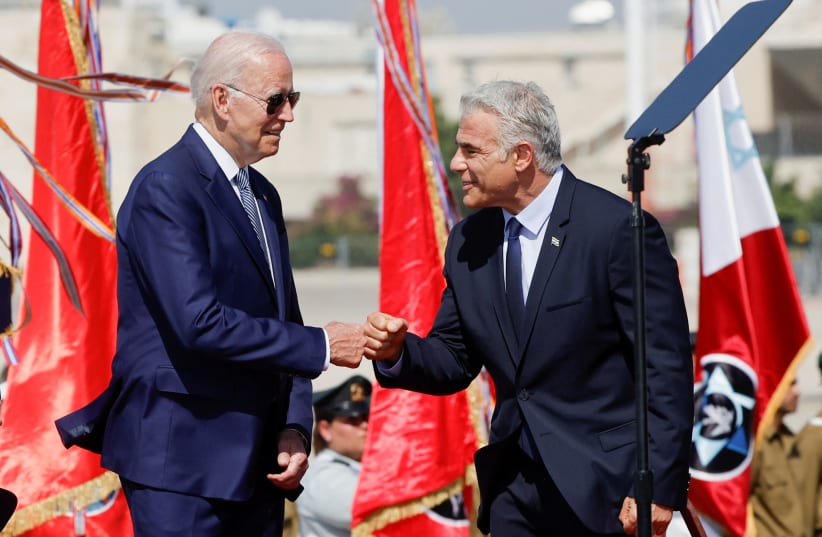
US President Joe Biden and Israeli Prime Minister Yair Lapid on Thursday will sign a joint agreement pledging to prevent Iran from acquiring a nuclear weapon on the second day of Biden's Middle East trip.
A senior Biden administration official, describing the joint declaration for reporters in a conference call, said the agreement will expand on the long-standing security relationship between the United States and Israel.
"This declaration is pretty significant, and it includes a commitment to never allow Iran to acquire a nuclear weapon and to address Iran’s destabilizing activities, particularly threats to Israel," the official said.
Biden, on his first Middle East trip since taking office in early 2021, arrived in Israel on Wednesday and has talks with Israeli leaders on Thursday. He will appear at a joint news conference with Lapid.
Biden will meet Palestinian leaders in the West Bank on Friday and hold talks with leaders of Saudi Arabia and other Gulf allies in Jeddah on Saturday.
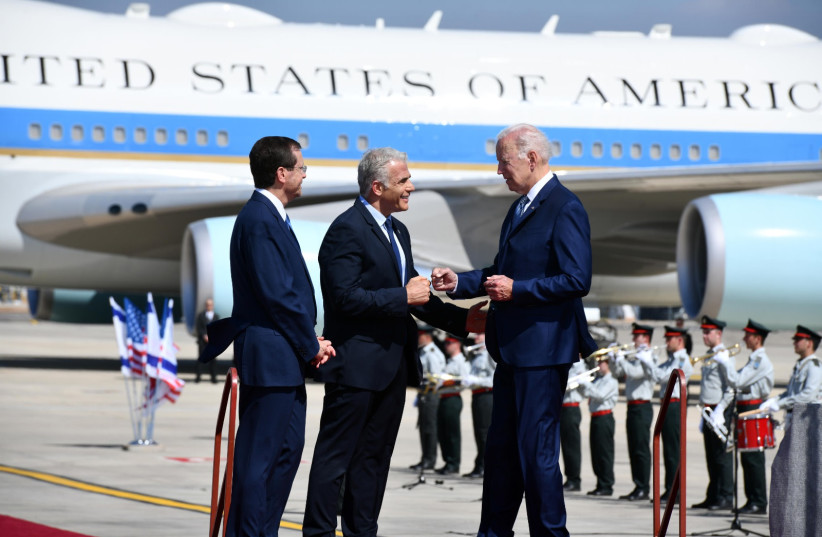
Going to be an uphill battle
Biden faces an uphill battle persuading Iran to rejoin the Iran nuclear agreement that his predecessor, Donald Trump, abandoned in 2018.
Biden is likely to face questions from Israel and from Gulf states such as Saudi Arabia and the United Arab Emirates about the wisdom of reviving the Iran nuclear deal and what the United States will do to counter Iran’s regional actions, regardless of whether the deal is resurrected.
In an Israeli television interview on Wednesday, Biden said the deal represented the best chance of holding up Iran's attempts to develop a nuclear bomb.
"The only thing worse than the Iran which exists now is an Iran with nuclear weapons and if we can return to the deal, we can hold them tight," he said. Asked if the United States could use force if needed, he said: "If that was the last resort, yes."
"This declaration is pretty significant, and it includes a commitment to never allow Iran to acquire a nuclear weapon and to address Iran’s destabilizing activities, particularly threats to Israel."
Senior Biden administration official
Some Israeli, as well as Gulf Arab officials, believe the deal's sanctions relief would provide Iran far more money to support proxy forces in Lebanon, Syria, Yemen and Iraq. They are also skeptical about whether the Biden administration will do much to counter Iran's regional activities.
Iran denies that its nuclear program is aimed at acquiring nuclear weapons.
The US official, asked if the declaration is about buying some time with Israel as Washington pursues negotiations with Iran, said: "If Iran wants to sign the deal that has been negotiated in Vienna, we have made very clear we're prepared to do that. And, at the same time, if they're not, we will continue to increase our sanctions pressure, we will continue to increase Iran's diplomatic isolation."
The official said the joint agreement will pledge ongoing US military aid for Israel and will emphasize support for the Abraham Accords, the agreements between Israel and a handful of Arab states that the Trump administration helped broker.
Go to the full article >>US would use force against Iran ‘as a last resort' - President Biden
“The only thing worse than Iran now is Iran with nuclear weapons,” US President Joe Biden said in an interview with Israeli media.
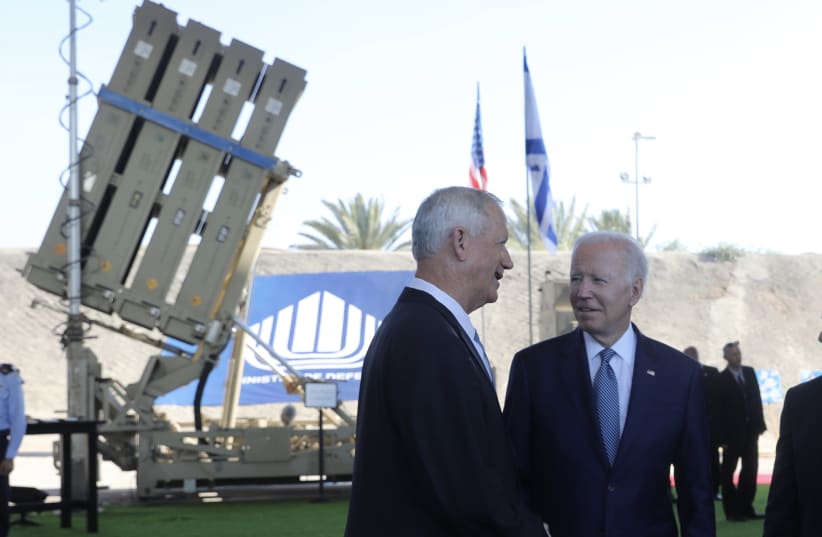
The US would use force “as a last resort” to stop Iran from developing a nuclear weapon, US President Joe Biden said in an interview with Channel 12 News that aired soon after he arrived in Israel on Wednesday.
“The only thing worse than Iran now is Iran with nuclear weapons,” Biden said, in an explanation of why the US continues to support the revival of the 2015 Iran deal. “I think it was a giant mistake for the previous president to get out of the deal. They are closer to a nuclear weapon than ever before.”
“We can act against [the Quds Force] and still have a deal that can curtail the nuclear program. I still think it makes sense,” he added.
"We can act against [the Quds Force] and still have a deal that can curtail the nuclear program"
US President Joe Biden
Asked if the use of force against Iran was on the table, Biden responded: “As a last resort, yes.”
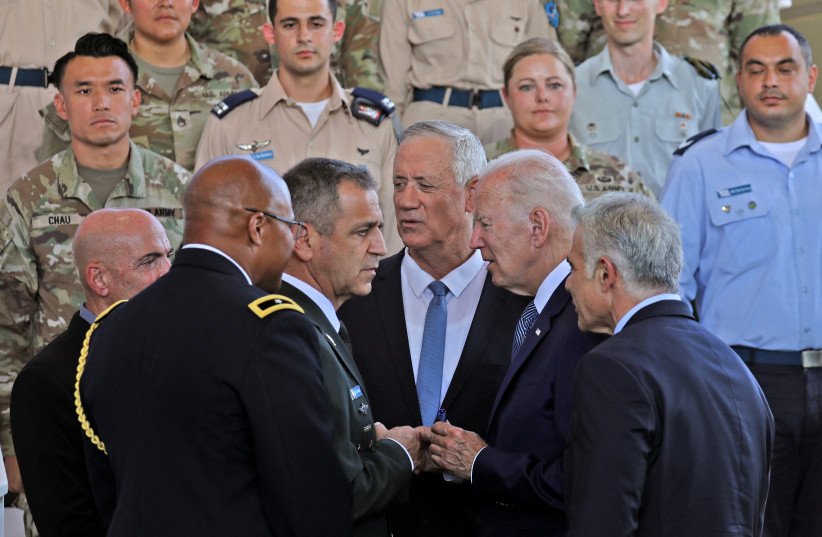
When interviewer Yonit Levy pressed Biden for details, he said: “I’m not going to speculate on that, but Iran can’t get a nuclear weapon.”
The president also said that he will keep the Islamic Revolutionary Guard Corps on the State Department list of Foreign Terror Organizations even if it means Iran will not sign back on to the agreement.
Saudi-Israel normalization “going to take a long time”
As for Biden’s next stop, in Saudi Arabia, the president said he is going to promote stability in the Middle East.
“It's an overwhelming interest of the US to have stability in the region,” he said. “Those that thought that the US was going to leave behind the Middle East and leave a vacuum that either China or Russia would fill – we can’t let that happen.”
Saudi-Israel normalization “is going to take a long time,” the president said, “but increasing the relationship in terms of acceptance of each other’s presence and working on certain things makes sense to me.”
Biden also said that “the more Israel is integrated in the region as equal and accepted, the more likely… it can come to an accommodation with the Palestinians down the road.”
Asked about Democrats who voted against funding for the Iron Dome and seek to curtail aid to Israel, Biden said “there are a few of them.”
“I think they’re wrong. I think they’re making a mistake. Israel is a democracy; Israel is our ally; Israel is our friend. I make no apology... It is overwhelmingly in our interest that Israel be stable,” Biden said.
Asked if there is a danger that the Democratic Party will turn its back on Israel, Biden said no, nor would the Republican Party.
As for visiting Israel during an election, Biden said that he is “committed to the state, not an individual leader.”
Tzvi Joffre contributed to this report.
Go to the full article >>Despite Israeli efforts, Biden visit won’t bring snapback sanctions on Iran - analysis
Washington's strategy seems to be to tolerate Iran continuing to enrich uranium to 60% for more potential bombs with the hope that Khamenei doesn't kick out the IAEA entirely.
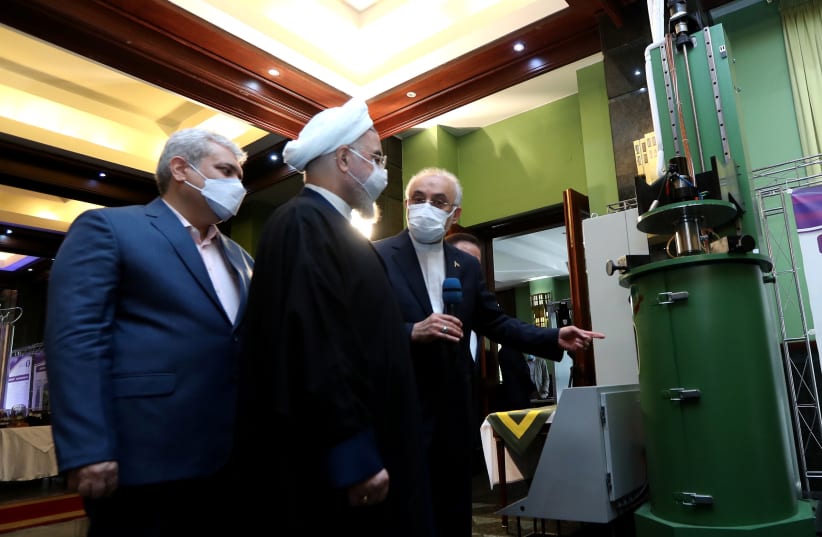
The International Atomic Energy Agency’s deadline for Iran to fully restore its nuclear inspectors’ surveillance cameras or risk causing a “fatal blow” to the JCPOA 2015 nuclear deal passed on July 8.
France is now threatening its own deadline of early August for the Islamic Republic to return to the nuclear deal.
Israel has been campaigning for a deadline and punishing Plan B if Tehran violates the deadline.
Yet, all signs are that the visit of US President Joe Biden to Israel will bring no deadline and no specific commitment to snapback sanctions on the ayatollahs.
The US on the Iran deal
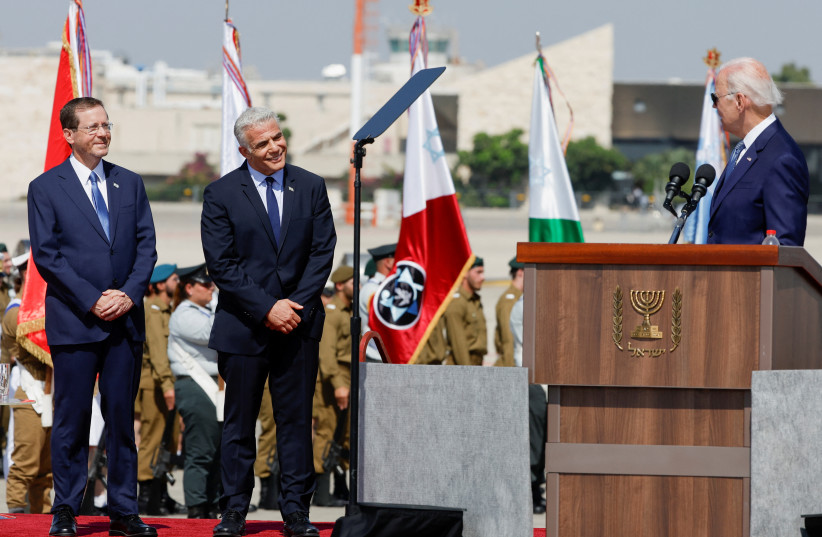
In a lead-up to the trip, US National Security Advisor Jake Sullivan said, “We’ve reunited our partners to ensure that it’s Iran, not the United States that is isolated until it returns to the nuclear deal. And the frequency of Iranian-sponsored attacks against our forces in Iraq and Syria has dropped dramatically.”
So, the strategy is isolation, but no real specifics about how and when that will get Iran Supreme Leader Ayatollah Ali Khamenei to back down from the nuclear threshold on which he is already basically standing.
Revealingly, Sullivan’s other main point was that Iranian-sponsored attacks on US forces in Iraq and Syria are down, which was not difficult since most of them have been pulled out.
Questioned about a deadline, he responded, “We have not marked a date on the calendar. We have indicated that we believe there is a deal on the table. It is a deal that we’re backing – that our European partners are backing – that is available to Iran.”
So no deadline, no mention of a referral to the UN Security Council and no snapback threat. This means the IAEA and France are now clearly tougher and more specific about being tough than the US.
What's the next move?
Sullivan continued, “If they don’t, we’re not standing still. Even as we speak, we’ve already introduced two rounds of sanctions to crack down on their effort to evade the existing sanctions regime. We are curbing their ability to smuggle oil, for example, through the Quds Force and other entities within Iran.
“And we’ll keep doing that,” he said, and referenced “increasing pressure” and the vote against Iran by the IAEA on June 8.
While it’s true that the Biden administration recently issued new sanctions on Khamenei’s precious Quds Force affiliates, it also outed Iran for helping Russia fight against Ukraine.
However, the new sanctions have zero chance of moving the dial on Iranian behavior beyond the existing sanctions.
At most, they send a very mild message that Biden does not intend to grant new concessions to reach a deal with Iran.
So what is the US plan for preventing Iran from crossing the nuclear threshold or from using the current extended period to conceal enough of its 60% enriched uranium for multiple nuclear bombs at a later date?
Put differently: What is to stop Iran from agreeing to a return to the JCPOA in another month or two and claiming it is ready to give up all of its enriched uranium back to the 2015 nuclear limits, while in reality it will only give up some and has hidden significant quantities while the IAEA was blind?
This was exactly what the IAEA warned about on June 9.
If the Biden strategy was to block this scenario, his visit to Israel could be used to announce a UN Security Council referral and a deadline, like France suggested, of a few weeks. If Iran violated the deadline, full global snapback sanctions could be invoked. That would be teeth.
Instead, it appears that Washington is months if not more away from making any concrete deadlines or threats.
Its real strategy right now seems to be to tolerate Iran continuing to enrich uranium to 60% for more potential bombs – as well as tolerate the IAEA’s partial blindness – with the hope that Khamenei refrains from publicly jumping to 90% weaponized enrichment and kicking the IAEA from the country entirely.
Go to the full article >>US President Biden holds security briefing, tours missile defense system
Biden was shown the remains of a UAV that had been intercepted by the Iron Beam laser defense system.
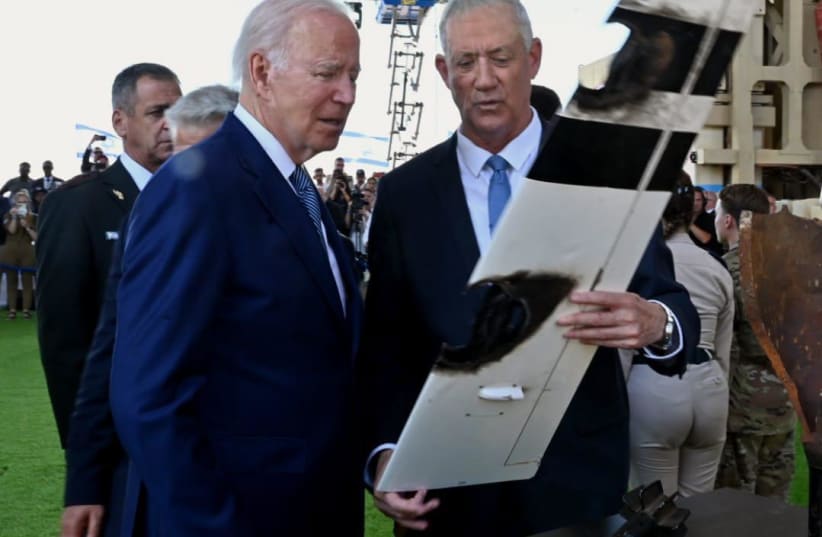
US President Joe Biden was presented with Israel’s latest missile defense system, the “Iron Beam” laser system during the start of his visit in Israel and Saudi Arabia this week.
Biden landed at Ben Gurion International Airport on Wednesday afternoon and was received by an honor guard and in the presence of President Isaac Herzog, Prime Minister Yair Lapid and Alternate Prime Minister Naftali Bennett.
Shortly after landing, Biden met with Defense Minister Benny Gantz, IDF Chief of Staff Lt.-Gen. Aviv Kohavi and other senior security officials. During the briefing, Biden was shown a video of the capabilities of Israel's air defense systems.
Following the meeting, the President toured a display of the air missile defense systems including the long-range Arrow, medium-range David’s Sling, short-range Iron Dome, and the high-powered laser Iron Beam interception system.
Together the systems provide Israel with a protective umbrella able to counter threats posed by both short, mid and long-range missiles used by terror groups in Gaza and Hezbollah as well as the threat posed by more sophisticated long-range Iranian ballistic missiles.

Israel continuously improves the technology behind the country’s anti-missile systems, and the Iron Dome along with the Iron Beam and naval Barak can also intercept drones and other aerial platforms. The Iron Beam is expected to work in tandem with the Iron Dome once it becomes operational in the next few years.
While at the display, Director-General of the Defense Ministry, Maj. Gen. (res.) Amir Eshel, presented the Iron Beam system to the United States Secretary of State, Mr. Antony Blinken, and National Security Advisor to the President of the US, Jack Sullivan.
Eshel also showed them the remains of an unmanned aerial vehicle and a mortar that had been intercepted by the system during a series of tests conducted this past April.
Thanking him for the funding for additional Tamir Iron Dome interceptor missiles, Gantz told the president that the alliance between the two countries “is stronger than ever” and that Jerusalem is “confident” that Washington “will continue to take the necessary steps to prevent Iran from acquiring nuclear weapons.”
The defense minister also noted that security cooperation in the region has intensified and expanded “in an unprecedented manner,” hinting to a regional air defense alliance that would see Israel work alongside Gulf countries to counter threats posed by Iran and its proxies.
The military cooperation in the region includes “many countries that see a need for stability and the development of sustainable peace,” he said. “Strengthening the security stability the United States is leading in the region, is a condition for both economic development and preserving human rights, and I am sure that under your leadership and together with all US security bodies, we will continue to develop it in all areas — air, sea, land and cyber.”
Kohavi, who also toured the systems with Biden said that "the operational cooperation and close coordination between the United States and Israel constitute further proof of the important strategic alliance between the two countries."
"Our relationship with the United States is a significant step in preserving regional stability."
IDF Chief of Staff Aviv Kohavi
"The strategic relations between the armies are a key pillar in maintaining security stability and in dealing with the common challenges in the Middle East and we strive to create a variety of new opportunities for air, sea and land cooperation,” the chief of staff continued, adding that “our relationship with the United States is a significant step in preserving regional stability, and in the face of the ongoing strategic race with Iran that not only endangers Israel but poses a regional and global danger, the countries of the region are required to act together.”
Tzvi Joffre contributed to this report.
Go to the full article >>Biden's east Jerusalem visit boosts PA claim to city - congressmen
The initiative to try and sway Biden not to make an unprecedented visit to the eastern part of the city was spearheaded by Rep. Beth Van Duyne of Texas.

President Joe Biden's scheduled visit to an east Jerusalem hospital on Friday will boost the Palestinian Authority's claim to that section of the city which is under Israeli sovereignty, six Republican representatives said in a letter they addressed to the White House.
"A visit would be viewed as a continued sign of continued support [for] the Palestinians in their illegitimate efforts to claim east Jerusalem," the six representatives.
The initiative to try and sway Biden not to make an unprecedented visit to the eastern part of the city was spearheaded by Rep. Beth Van Duyne of Texas.
It was signed by three other Texas Representatives; Randy Weber, Pete Sessions and Ronny Jackson. Representatives Bill Johnson of Ohio and W. Gregory Steube Florida also signed the document.
Biden will be the first US President to visit an east Jerusalem location identified with the Palestinians and it is seen as a nod in the US acceptance of the Palestinian's right to have their capital there.
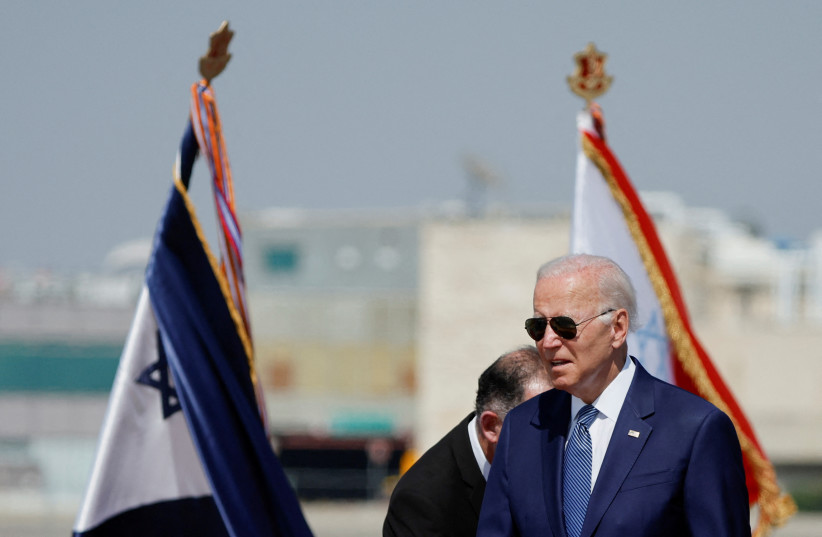
Former US president Donald Trump visited also crossed the Green Line during his 2017 visit, but he went to the Jewish holy site of the Western Wall, in a move that preceded his recognition of Jerusalem as Israel's capital and his relocation of the US Embassy to that city from Tel Aviv.
The United States Congress recognized Jerusalem as Israel united capital in 1995 when it passed the US Embassy Act.
They recalled that Biden had supported that Act when he was a senator.
"Palestinians see East Jerusalem as the capital of a future independent state. Israel considers the whole of Jerusalem - including the East, which it occupied in the 1967 Middle East War - as its indivisible capital," the representatives said.
They recalled that in October 168 House republicans had signed a letter opposing any US moves to reopen the east Jerusalem Consulate General that had served as a de facto embassy to the Palestinians until Trump closed it in 2018.
Biden has promised to re-open that Consulate but has yet to secure the needed permission from Israel. Friday's visit is seen as s gesture in lieu of that move.
"Israel has a sovereign capital, and just like no other nation has another consulate on its territory, neither should Israel," the representatives said.
Former Israeli Ambassador to the United Nations Danny Danon wrote in an open letter that such a visit would symbolize support for the PA's efforts to divide Jerusalem.
In contrast, the left-wing Israeli NGO B'Tselem pushed Biden to recognize Israel as an apartheid state.
“Mr. President this is apartheid,” stated the Israeli left-wing NGO B’Tselem in a signage campaign it launched hours before Biden arriva.
It has placed large signs of buildings in the two Palestinian cities of Bethlehem and Ramallah.
Biden is a strong proponent of a two-state resolution to the Israeli-Palestinian conflict and plans to meet separately with Prime Minister Yair Lapid and Palestinian Authority President Mahmoud Abbas during his three-day trip.
B’Tselem last year, however, issued a report which charged that in reality, there is only one Israeli “apartheid regime” that controls the entire area from the Jordan River to the Mediterranean Sea.
Two international NGOs, Human Rights Watch and Amnesty International issued similar reports.
Israel and the United States have rejected all such claims, with US Ambassador to Israel Tom Nides calling it “absurd.”
B’Tselem Executive Director Hagai El-Ad said on Wednesday, “The US must acknowledge that the area between the Jordan River and the Mediterranean Sea is governed by an apartheid regime, and change its attitude to Israel accordingly. When the attitude changes – so will the regime.”
The left-wing NGO Peace Now weighed and call on Biden to relaunched a peace process for a two-state resolution to the conflict. Earlier this week it hung asign in Tel Aviv with an Israeli and a Palestinian flag that stated, “President Biden, welcome to the two countries we love the most."
Go to the full article >>US, Biden must change course on Iran nuclear policy, Pastor Hagee says
Biden "will need to make clear...that he hears concerns on America's weak policy toward Iran and he is going to change course," Pastor John Hagee said.
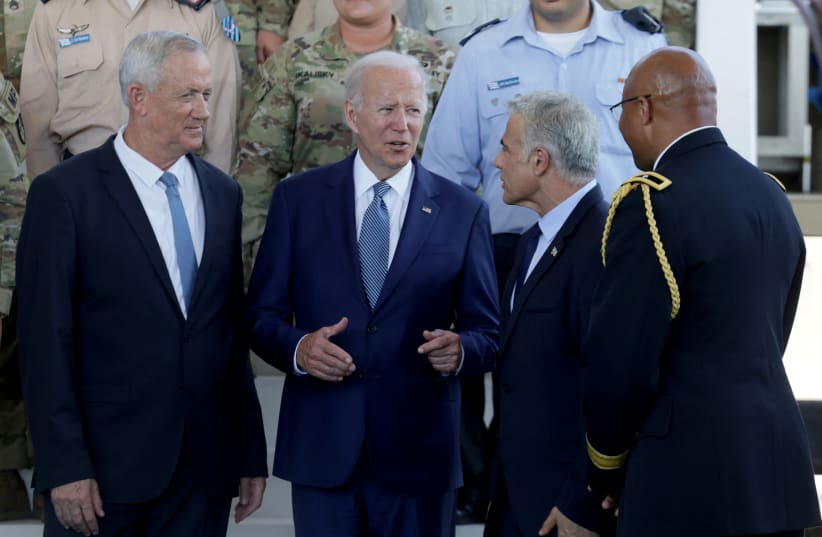
Pastor John Hagee, founder and Chairman of Christians United For Israel (CUFI), said in an interview that President Joe Biden needs to “change course” on his Iran policy.
“We hope that the president has a successful trip to the region, but he will need to make clear to the Israelis and the Arab leaders with whom he is meeting that he hears their concerns on America's weak policy toward Iran and he is going to change course,” he said. “We want him to be very, very firm in his support of Israel and to make it known that it is not possible for the American people to accept the fact that Iran would have a nuclear weapon.”
"We want him to be very, very firm in his support of Israel"
Pastor John Hagee
Next week, CUFI will hold its annual conference in person in Washington for the first time since the beginning of the COVID-19 pandemic. “We're excited about all of our leadership from across the nation coming to the national conference,” he said.
Hagee also denounced the US Presbyterian Church vote to declare Israel an apartheid state and establish a Nakba Remembrance Day, saying it was “an insignificant charge by an insignificant group.” He added that the recent resolutions “are pure antisemitism.”
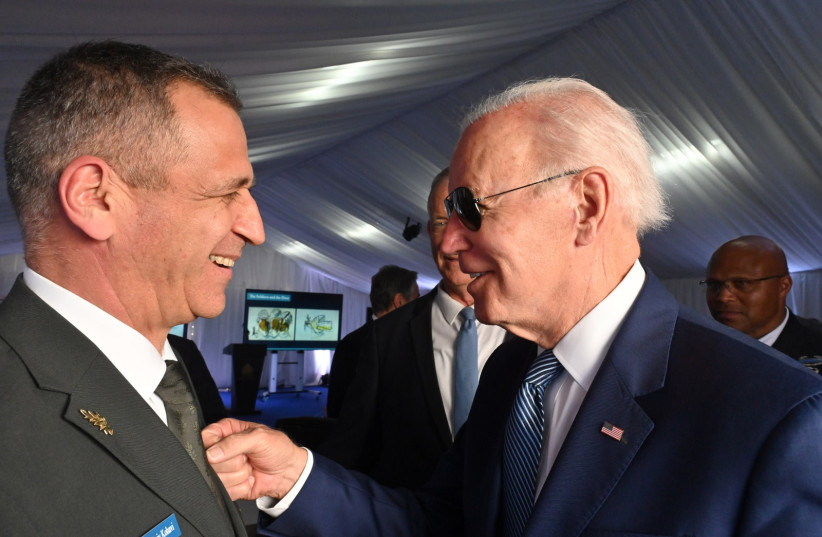
The DEFEND Act
Sandra Hagee Parker, Chairwoman of the CUFI Action Fund, said that the 2022 DEFEND Act is at the top of the group’s agenda. If signed into law, the bipartisan bill would authorize the Secretary of Defense to cooperate “with allies and partners in the Middle East–including those who signed the Abraham Accords” to develop and implement “an integrated air and missile defense architecture to defend against Iranian threats.”
“The Abraham Accords has shown the world that peace pays off and it has created pathways for people-to-people exchanges that are necessary for lasting peace,” she said.
“And what this bill does, it underscores that the Abraham Accords are not the end, but the beginning of the efforts for lasting peace and prosperity in the region.”
She said that the DEFEND Act “is vital in bringing America's allies together in the region in order to confront Iran.”
“We have had relationships with these countries independently, but now that they're normalizing with Israel, it's up to us to lead the effort to ensure that everybody is working strategically in terms of missile defense and security cooperation in the region,” said Parker. “The bill assesses the need for improved integrated air and missile defense cooperation between the United States and our Middle Eastern allies and provides an explanation of how this integrated missile defense improves collective security in the region.”
Another item on the agenda is the "COI Elimination Act." Parker that the Comission of Inquiry is "another effort by the United Nations to totally isolate, delegitimize and single out the nation of Israel. And we do welcome the Biden administration statements acknowledging that this latest COI, the effort to investigate Israel, is blatant antisemitism, but statement in and of itself is not enough.”
Go to the full article >>The when and where of President Joe Biden's visit to Israel
Here's US President Joe Biden's schedule during his visit in Israel.
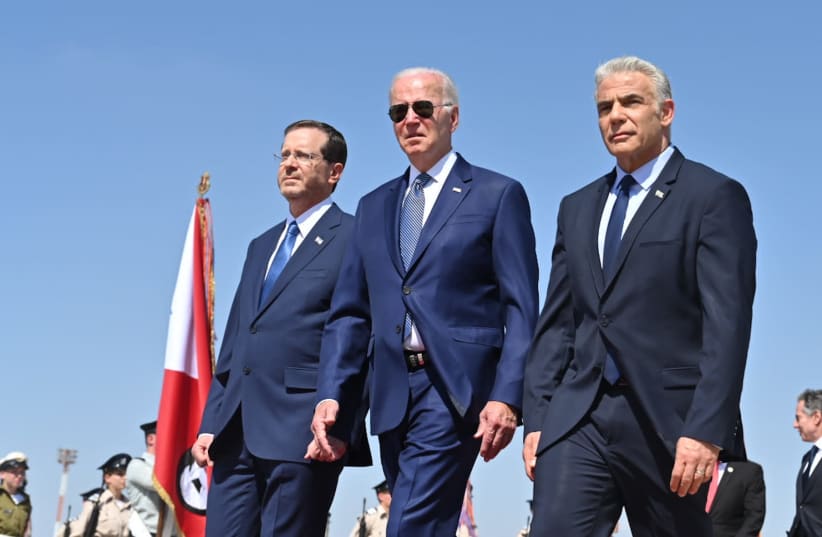
US President Joe Biden landed in Israel on Wednesday afternoon, launching his first official visit to the country as president. Following is Biden's schedule for the visit:
Wednesday
4:20 p.m. - Biden receives a briefing on the Iron Dome and Iron Beam air defense systems at Ben-Gurion Airport
4:50 p.m. - The president departs to Jerusalem
5:25 p.m. - The president arrives at Yad Vashem in Jerusalem
5:35 p.m. - The president participates in a wreath-laying ceremony alongside Prime Minister Yair Lapid and President Isaac Herzog
Thursday
11:15 a.m. - Bilateral meeting between Lapid and Biden followed by a larger meeting including staff members
12:30 p.m. - Biden and Lapid will hold a virtual meeting as part of the I2U2 grouping including leaders from India and the United Arab Emirates
1:30 p.m. - Lapid and Biden will hold a press conference
5:30 p.m. - Lapid and Biden will take part in a ceremony at the Israeli President's Residence
7:50 p.m. - Biden and Lapid will take part in the opening ceremony of the Macabiah games at Teddy Stadium in Jerusalem
Friday (Times to be announced)
Biden will visit Augusta Victoria hospital in east Jerusalem and will proceed to visit Bethlehem
Lapid will take part in a small farewell ceremony for Biden as he departs to Saudi Arabia
Go to the full article >>Biden to sign US-Israel strategic cooperation agreement during visit
Israel and the US will sign a strategic cooperation agreement in the field of advanced technologies. It will focus on climate, epidemics, AI and quantum.
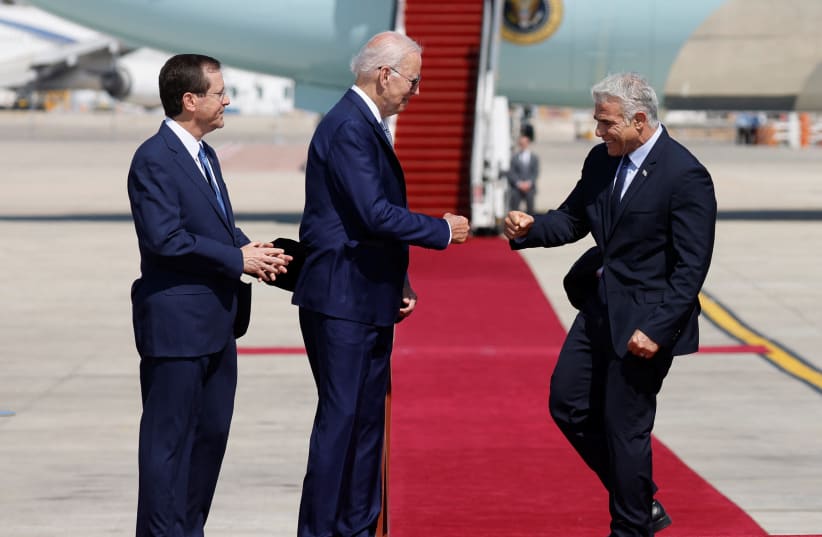
A strategic cooperation agreement in the field of advanced technologies that will focus on the areas of climate, preparedness for epidemics, artificial intelligence and quantum will be signed between Israel and the US during the Biden visit.
The National Security Headquarters will coordinate the effort in which the Ministry of Innovation, Science and Technology and the Health and Environmental Protection Ministries will lead professional work teams in selected fields.
Prime Minister Yair Lapid and US President Joe Biden made a joint statement regarding the launch of the strategic cooperation agreement.
What is included in the agreement?
The ministries will provide the framework for it. Professional teams are expected to start operating in the coming months to promote technological-strategic dialogue that will significantly deepen the strategic partnership in cutting-edge technologies.

The two governments said the goal of the cooperation is to give expression to the special relationship between the US and Israel, anchor the partnership between the countries and set Israel’s position among America’s leading allies in the field of technology. Their joint commitment to tackling will shape the next decade, they said.
Science and Technology Minister Orit Farkash Hacohen (Blue and White) commented: “I am pleased that the president’s visit will include a statement on his behalf about strengthened technological cooperation between the two governments, after work we have promoted in my ministry and the Environmental Protection Ministry in recent months. Artificial intelligence, quantum, climate, dealing with epidemics, reducing greenhouse gas emissions are among the areas in which we will strengthen the joint work. It is good for the Israeli economy, science and high-tech. Joint working groups from Israel and America will start work immediately.”
Environmental Protection Minister Tamar Zandberg added that “Israel and the US share many common values. The two governments see the climate crisis as one of the greatest threats to man, and the fight against it and preparing for it are in our common interest. As part of strengthening technological cooperation with the US – Israel’s closest friend – I am pleased to lead a joint working group that will develop solutions to this global climate crisis challenge.”
Health Minister Nitzan Horowitz concluded: “I welcome the agreement, which will contribute to the realization of the advantage inherent in technological advances and medical innovation for the safety and health of the citizens of both countries. This is significant news that will leverage the scientific power of Israel, the scientific community, local societies and the entire Israeli economy. This is a basis for maintaining Israel’s national resilience. Scientific collaborations by institutions in the two countries will greatly contribute to the advancement of science in Israel and to exposure to unique science infrastructures located in the US.”
Go to the full article >>Important facts
- Biden will be in Israel until Friday.
- He will meet with both Israeli Prime Minister Yair Lapid and Palestinian Authority President Mahmoud Abbas.
- Ahead of the visit, the US and Israel announced the establishment of a tech dialogue between the countries.